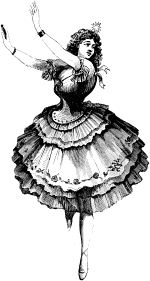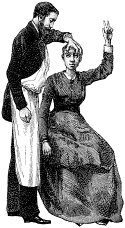Search us!
Search The Word Detective and our family of websites:
This is the easiest way to find a column on a particular word or phrase.
To search for a specific phrase, put it between quotation marks. (note: JavaScript must be turned on in your browser to view results.)
Ask a Question! Puzzled by Posh?
Confounded by Cattycorner?
Baffled by Balderdash?
Flummoxed by Flabbergast?
Perplexed by Pandemonium?
Nonplussed by... Nonplussed?
Annoyed by Alliteration?

Don't be shy!
Send in your question!
Columns from 1995 to 2006 are slowly being added to the above archives. For the moment, they can best be found by using the Search box at the top of this column.
 If you would like to be notified when each monthly update is posted here, sign up for our free email notification list.
If you would like to be notified when each monthly update is posted here, sign up for our free email notification list.
Trivia
All contents herein (except the illustrations, which are in the public domain) are Copyright © 1995-2020 Evan Morris & Kathy Wollard. Reproduction without written permission is prohibited, with the exception that teachers in public schools may duplicate and distribute the material here for classroom use.
Any typos found are yours to keep.
And remember, kids,
Semper Ubi Sub Ubi
|
Untucked.
Dear Word Detective: My love of language and crossword puzzles started with my grandfather. As an English major with a Latin minor my interest grew. My two children have always gotten the answer, “Look it up” when asking questions about word meanings and they have developed the habit of trying to confound me with a word they have discovered. The latest question is the origin of the word “skirt” as in “to skirt an issue.” I found nothing in your archives and I hope you will have better luck. — Marsha Orson.
Me too. Incidentally, I should probably explain that the archives to which you refer are available absolutely free at the Word Detective website (www.word-detective.com). There you’ll find more than a thousand back columns, helpfully indexed in something very close to alphabetical order. I go there myself from time to time, and I’m always surprised at how smart I used to be. Seriously, I don’t remember writing half of that stuff.
 A typical Viking. “Skirt” is an interesting word with some interesting connections to other words. The root of the English noun “skirt” is the Old Norse word “skyrta,” which is not very surprising, given that the Viking invasions of Britain that began in the 8th century left behind all sorts of words rooted in Old Norse. What is a bit surprising is that the Old Norse “skyrta” doesn’t mean “skirt.” It means “shirt,” and, if you go a bit further back in history, you’ll find that the Germanic root that produced the Norse “skyrta” (which became our English “skirt”) also produced the English word “shirt.” In other words, “skirt” and “shirt” are basically the same word, except that “skirt” was filtered through Old Norse before it entered English, and “shirt” wasn’t.
But wait, there’s more. The Germanic root (“sker”) that eventually produced “skirt” and “shirt” meant “cut,” and also eventually produced our English adjective “short” (as well as “score,” “share,” “shear” and several other English words). The original sense of both “shirt” and “skirt” was, in fact, simply “short garment.” The question, obviously, is how a “shirt” came to mean a loose tunic worn above the waist, primarily by men, and “skirt” came to mean the part of a woman’s dress below the waist (or today usually a separate garment). The answer probably lies in the fact that the modern Icelandic word “skyrta” means a long shirt that hangs well below the waist, so perhaps the Viking “skyrta” was even longer.
In the centuries since “skirt” appeared in English around 1300, it has acquired a variety of figurative meanings, the most important, for our purposes, being “the border, rim, boundary or outlying part” of anything, including a town or village. This sense comes by analogy to the loose bottom edge of a skirt, and we most often encounter it in the modern English term “outskirts,” meaning the outlying parts of a town or city.
As a verb, “to skirt” (which first appeared around 1600) reflected this “boundary” sense from the beginning. In its earliest uses, “to skirt” meant “to border or form a border around something: (“Those vast and trackless forests that skirted the settlements,” 1820). But “to skirt” was also used to mean “to travel through the outskirts of a place,” and specifically to pass around, rather than directly through, a town, village or other place (“Then I set off up the valley, skirting along one side of it,” 1869). It is this sense of “skirt,” with the figurative meaning of “evade or dodge,” that we use when we speak of a politician “skirting” sensitive issues in a press conference, for instance.
One paper jam over the line.
Dear Word Detective: “Out of whack” doesn’t make any sense to me (but it might just be me). I asked a friend, and she suggested that it might come from old cars (mostly Russian) that started up if you gave them a good whack. This explanation makes sense; after all, my (broken) pencil sharpener needs to be whacked before it will start … but I think it might be too perfect. Can you give me some information? — Aife.
 A minor adjustment often helps. Wow. You own a pencil sharpener? I’m not certain that I still even own a pencil. I do have some pens that followed me home from the office about fifteen years ago, but I use them mostly just to write checks. (They’re a special type that writes on rubber.) What never fails to amaze people, however, is the fact that I don’t own a computer printer. If I need to save something from the web, I usually copy it by hand or just draw a picture of it.
All of which brings us back to “out of whack.” Almost every gizmo found in modern life goes kablooey at some point. The toaster decides you like your bagels “cajun style.” The dishwasher suddenly starts bending all your forks. Sometimes the cure for an “out of whack” appliance is as simple as placing it on the curb the day before trash pickup. This method is especially effective on toasters, which are easily intimidated. Other machines, however, are utterly incorrigible. My last printer, for instance, refused to print even after being tossed out a second-floor window.
“Whack” as a verb first appeared in the early 18th century meaning “to beat or strike sharply and vigorously,” and was probably formed in imitation of the sound such a blow would make. As a noun, “whack” started out meaning just such a blow, but soon developed a range of secondary meanings. One of the odder uses was “whack” meaning “a portion, one’s share,” originally slang in the criminal underworld meaning “a share of the proceeds of a crime.” Just how this sense developed is uncertain, but it may have been coined as a play on the “splitting” of the loot. This “fair share” sense then went on to mean “an agreement” (“‘I’ll stay if you will.’ ‘Good — that’s a whack’,” Mark Twain, Tom Sawyer), and, in the 19th century, “in fine whack” and similar phrases appeared meaning “in good order” or, of a person, “in good shape.”
By 1885, the opposite sense had predictably appeared, and a person (or body part) in bad shape was described as “out of whack” (“His liver is out of whack and no mistake,” 1918). Almost immediately the phrase was also applied to mechanical devices (“Being able to get at any part of the mechanism which may be ‘out of whack’ is important,” 1906), which is the most common sense in use today.
Pencil me in.
Dear Word Detective: I was reading nothing in particular about television scheduling the other day when I had one of my word moments, that is, when a word leaps out of the page and begins to play odd tricks in my mind. The word was “slot” and, within moments, it became a description of some kind of Eastern European, perhaps an obscure currency or perhaps even a breed of dog. It certainly looked most peculiar and reeked of Old Norse or something. However, my dictionary could only come up with a feeble stab at something to do with a breastbone, but labeled it “origin obscure.” Any ideas about a word that is probably used a thousand times a day in Las Vegas alone? — David, Ripon, England.
Obscure currency? I assume you’re thinking of the “zloty,” the currency of modern Poland. “Zloty” is actually pronounced something close to “zwah-teh,” and comes from “zloto,” the Polish word for “gold,” which is related to our English word “gold,” both being derived from the Indo-European root “ghel,” meaning “yellow.” As for “breed of dog,” beats me.
 There are actually five, count ’em, five kinds of “slot” in English, each considered a separate word. The oldest, from the 14th century, means “a bolt or bar that secures a door.” Another “slot” means “the track of a animal,” from the same Old Norse root that gave us “sleuth.” Yet another “slot,” now obsolete, meant “a muddy place.” A fourth “slot” means “castle,” but it’s also obsolete and was just a development of the “door bolt” kind of “slot” anyway. There are actually five, count ’em, five kinds of “slot” in English, each considered a separate word. The oldest, from the 14th century, means “a bolt or bar that secures a door.” Another “slot” means “the track of a animal,” from the same Old Norse root that gave us “sleuth.” Yet another “slot,” now obsolete, meant “a muddy place.” A fourth “slot” means “castle,” but it’s also obsolete and was just a development of the “door bolt” kind of “slot” anyway.
Finally, we have the sort of “slot” you mention, and here things get a little weird. The original meaning of this “slot” when it first appeared in English in the 14th century, adapted from the Old French, was (as the Oxford English Dictionary (OED) puts it) “the slight depression or hollow running down the middle of the breast,” especially the hollow at the base of the throat. Interestingly, the Old French word that gave us “slot” was “esclot,” which meant literally “hoofprint of a horse,” which seems a singularly unromantic, if technically plausible, way to describe the hollow at the base of your sweetie’s throat. Incidentally, that same “esclot” root underlies the other sort of “slot,” mentioned above, that means “track of an animal.”
In any case, by the 15th century “slot” had begun to develop its more familiar modern senses, beginning with “an elongated depression or hole in a piece of lumber, etc., where another piece is inserted.” The use of “slot” for the opening in a vending machine where you put coins dates from the late 1800s, and meaning “parking space” from the 1940s.
Perhaps the most dramatic development of “slot” also came in the 1940s, when it was first used to mean (again quoting the OED) “a position in a list, hierarchy, system, or scheme; a position to be filled; a category; a place or division in a timetable, especially in broadcasting” (“Suitable slots are normally of 90 to 120 minutes, with time for commercials to be taken out of this,” 1976). This figurative use of “slot” was almost certainly an outgrowth of the modern mania for organizational and scheduling charts in which predefined categories or spaces (“slots”) remain fairly constant while the data that fills them varies.
|
Makes a great gift! Click cover for more.  
400+ pages of science questions answered and explained for kids -- and adults!
FROM ALTOIDS TO ZIMA, by Evan Morris
 
|


 can be found
can be found 







Recent Comments